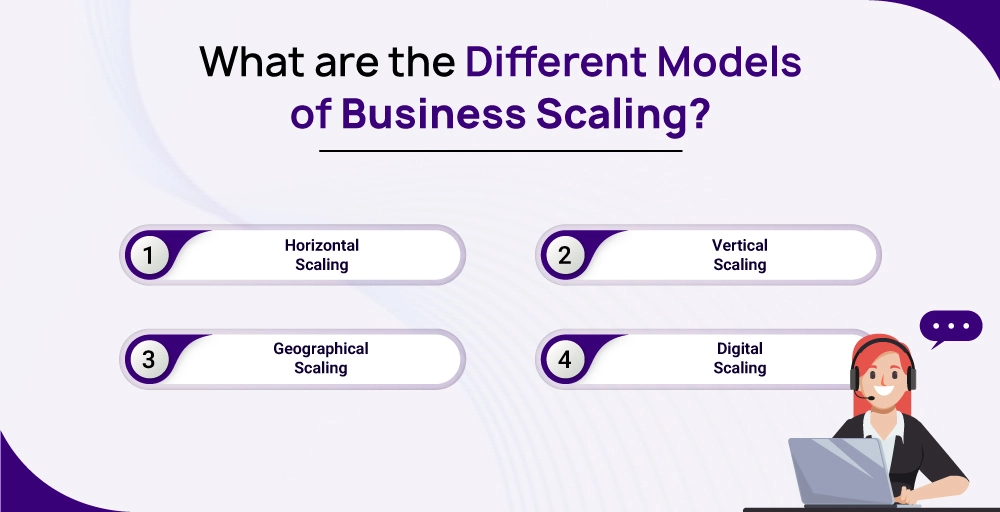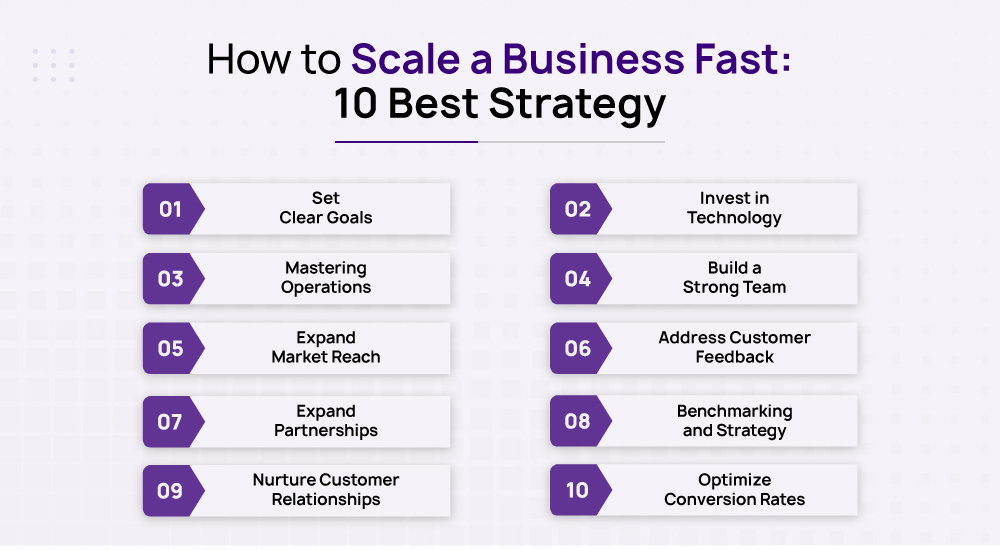Would you like to see 😊 your business expand globally, reach new markets, and generate huge profits?
In that case, you have found yourself in the exhilarating world of business scaling.
In this blog, you’ll learn everything about business scaling, including types, what challenges you may face, and scaling strategy step by step.
🔑 Key Highlights
- Business scaling is the strategic and efficient process of increasing business growth without a proportional increase on costs or resources.
- Scaling a business provides numerous benefits including increased efficiency, wider audience reach, and more profit.
- Business scaling involves strategies like setting a clear goal, expanding market reach, building a strong team, and expanding partnerships.
- Various tools are present that help in increasing scaling your business, among them, KrispCall stands out as the best solution for scaling.
Let’s get started! 👇
What does scaling mean in business?
Business scaling refers to the strategic and sustainable growth of your business so that your productivity and revenue exceed the cost. It means having the ability to grow without being hampered.

It implies the planned and tactical distribution of resources to satisfy the expanding market needs.
Example: A small bakery owner Chris has gained loyal customers in his neighborhood because of his handcrafted bread. Scaling, in this context, increases production and goes beyond increasing production.
The bakery now introduces new cakes and pastries(horizontal scaling), introduces new advanced technology for the betterment of the products(vertical scaling), opens new branches in other communities(geographical scaling), and establishes an online presence(digital scaling). With its focus on sugar-free products and strategic partnerships with a local business, the bakery now stands out as a special niche player. This approach ensures diversified and sustainable growth in the market.
Why is Scaling important in business?
In the developing phase of any kind of business, whether it be a small business, a freelancing business, or an independent professional scaling in business is an important factor for the profitable growth of the business.
Some of the reasons why Scaling is important in business are:
- Increased Revenue: One of the primary benefits of scaling is that it allows businesses to expand their operations and reach a larger number of customers, which in turn generates more revenue.
- Cost Efficiency: Scaling results in the cost-efficiencies of the business due to economies of sale. Businesses can reduce the cost per unit, enhance the overall productivity of the business, and negotiate better deals with suppliers with increased productivity and delivery service.
- Optimize Resources: Optimizing the resources is the next benefit of scaling. A company or business can more efficiently utilize its resources as it grows in size. This includes streamlining operations, utilizing technology, and making strategic decisions about workforce management and infrastructure to handle increased demands.
- Increased competitive advantage: Scaling enables businesses to stay ahead of the competition by providing essential resources and flexibility so that one can always stay competitive in the market.
What are the Different Models of Business Scaling?
There are various business scaling models each with unique strategies for growth and development of business.

Some of the business scaling models are:
1. Horizontal Scaling
Horizontal Scaling is a type of business scaling that helps to expand business products or services. Its main purpose is to diversify the selection of goods and services available in the current market.
For example: An IT company that started out offering software solutions may horizontally scale by providing additional products or services such as hardware.
2. Vertical Scaling
On the other hand, Vertical Scaling mainly focuses on enhancing and optimizing pre-existing goods and services. Businesses aiming to improve the features, quality, or effectiveness of what they currently offer can be promised to use this model.
For example: A manufacturing company investing in innovative technologies to enhance the production process and deliver high-quality products is an example of vertical scaling.
3. Geographical Scaling
Geographical scaling is the process of expanding your business in new geographical markets. Establishing new branches, moving to a new city, or expanding internationally can all be part of this process. This allows businesses to reach new markets and adapt their offerings to meet the locals’ needs.
For example: The coffee shop owner identifies the major cities within the country where the coffee demand is high and strategically opens branches in those cities to reach broader customers.
4. Digital Scaling
One of the scaling models is digital scaling which involves the use of digital platforms and technology to enhance business operations and reach a large number of audiences.
For example: A local bakery has a digital scaling success when it goes online allowing customers to order bakery products globally. The bakery reaches a wider audience with a user-friendly website, e-commerce integration, and social media engagement.
What are the challenging aspects of scaling your business?
Scaling your business is a challenging task, it requires excellent strategies. You may encounter many hurdles while scaling your business. Statistics show that about 70% of startups find it difficult to scale their business.
Some of the common challenging aspects of scaling your business are:
- Scaling too early: One of the most prevalent challenges faced during scaling a business is the temptation to scale too early. This results in increased operational costs without matching a rise in revenue.
👍 Solutions: Before thinking about scaling your business, conduct market research, evaluate financial conditions, and make sure there is sustainable demand for their goods to reduce the risks associated with growing too soon.
- Insufficient market validation: The next challenging aspect could be insufficient market validation. This issue arises when a business expands too quickly without investigating the market trends and whether the market will accept its products or not.
👍 Solutions: Always conduct market research to understand the market trends and demands of the market and also look for the customers’ feedback on product development and scaling strategies.
- Infrastructure Challenges: The infrastructure challenge is also one of the most challenging aspects of business scaling. Various aspects including technological limitations, and organizational inefficiencies come under these challenges.
👍 Solution: Businesses should always look for the infrastructure challenges that may arise during scaling a business. To tackle this challenge you should strategically invest in technology upgrades, and implement scalable systems.
- Neglecting experimenting: Neglecting experimenting during scaling could lead to missed opportunities for innovation and growth. The experimentation reduces uncertainty and offers concrete data for informed decision-making.
👍 Solutions: Before scaling your business always run an experiment rather than finding out it doesn’t work after spending on it. You can decide which marketing campaign and channel to use after experimenting.
10 Best Strategy to Scale a Business Fast
Scaling business requires a strategic approach for profitable growth and ensures sustainable expansion. Many businesses underperform during scaling because they do not have a clear idea of where they want to take their business before it grows rapidly.

Here are the 10 best strategies on how to scale a business fast:
1. Set clear goals
Setting clear goals before scaling a business is one of the best strategies. It involves measurable, well-established, accurate, and relevant objectives to give a business a well-defined roadmap. Setting clear goals gives direction and purpose, whether your focus is to increase sales, market expansion, or operational efficiency.
Moreover, they also allow for tracking the progress reports of the companies, identifying areas for improvement, and recognizing success which will ultimately help in business growth.
2. Invest in technology
Investing in technology is a crucial component for scalable companies to stay competitive in the market. Technological investments can increase productivity, reduce expenses, and improve operations by using advanced software solutions, automation, and the integration of artificial intelligence.

Furthermore, adopting the latest technology enables businesses to stay updated with market developments and changing customers’ tastes.
3. Mastering Operations
When it comes to scaling processes efficiency is the key factor. Mastering operations allows you to eliminate bottlenecks, reduce waste, and maximize productivity. Through thorough investigation and optimization of operational procedures, scalable companies can achieve a degree of proficiency that helps in increasing revenue and the long-term growth of the business.
4. Build a strong team
Building a strong team member helps to scale your business and is the foundation of the long-term growth of scalable companies. This not only brings individuals together but also involves creating a unified and effective team that works for the same objective.
The right team can overcome any of the challenges and use different viewpoints to come up with creative ideas by establishing a supportive environment.
5. Expand market reach
For the positive growth of the business you have to expand your market reach so your product can reach more customers. Diversifying your customer base and exploring new markets also help your business become less dependable on a particular market and provide a stronger base for your future growth.
6. Address customer feedback
To approach a customer-centric business, addressing customer feedback is an important task to scale your business. When businesses value and respond to customer feedback, they can build trust and gain useful insights for improvement.

Businesses can build a strong relationship with their customer base and position themselves for long-term success in competitive marketing.
7. Expand partnerships
Expanding partnerships could be another effective strategy to scale your business. Partnerships may take different forms, from alliances with complementary businesses to strategic collaboration with industry leaders. In addition to encouraging existing relationships, this strategy also fosters innovation.
8. Benchmarking and Strategy
A benchmarking tool is used to measure and compare your performance against your competitors. This involves performance indicators and practices to identify areas for improvement. It is not only about comparing numbers but also learning from successful practices and adapting strategies to enhance overall performance for successful performance.
9. Nurture customer relationships
Customer relationships are the next strategy for growing a business. It involves building deep relationships with the customers, understanding customer needs, and engaging in a way that goes beyond simple transactions.
Consistent communications, customized offers, and kind actions reinforce the brand’s dedication to its clients and enhance the brand experience.
10. Optimize conversion rates
Optimizing conversion rates is a strategic way for businesses looking to maximize the value of their online presence. Businesses can identify the potential friction points and streamline the conversion process.
Some of the examples of optimizing conversion rates include improvements to web design, clear call-to-action, and targeted messaging that fit the customer’s needs. Testing and data analysis are essential for better understanding the audience and optimizing conversion tactics.
Scale Your Business Globally With the KrispCall Cloud Phone System
KrispCall, one of the best cloud-based telephony systems helps to expand your company worldwide through its virtual phone system and enhance your business communications. With multiple phone numbers, it can also be used for global calling, enabling you to communicate with team members and clients anywhere in the world without any problems.

Some of the features why you should consider the KrispCall phone system to scale your business are:
- Flexibility: Work from anywhere and integrate effortlessly
- Crystal-clear call: Empower remote collaboration fostering seamless communication across teams and customers
- Virtual phone number: Manage multiple internet-based phone numbers with ease
- Scalability: Always adapting to your evolving business needs
- Call analytics: Track the trends and identify call data patterns for predicting future needs and make proactive adjustments to your organization
If you are curious about how KrispCall works, you can Book a free demo.
Wrapping Up
To sum up, scaling your business is not just a goal but a journey fueled by ambition and flexibility. Always remember, there is no one-size-fits-all recipe but with a clear set of goals, data-driven decisions, and the right use of technology, you can grow from a small seed to a massive tree.
Now, it’s your turn to jump on the opportunity to establish your own scaling success story.
If you are looking👀 for the best scaling solution, KrispCall is your reliable partner for effortless communication and opening up new opportunities.
FAQs
1. What is the difference between scaling and growing a business?
The difference between scaling a business and growing a business is:
| Growing a business | Scaling a business |
| Increases revenue, customer base, and output over time. | Increases revenue without increasing costs or resources. |
| Focus on manageable progress, achieved by hiring new employees, opening new branches, or launching new products. | Focus on achieving sustainable growth without a rise in operational inputs. |
| It is less risky as it allows businesses to adapt to changes organically. | It is more risky as it requires effective strategies and efficient processes. |
2. Is scaling only for large-sized businesses?
No, scaling is not only for large-sized businesses. Businesses of all sizes including small businesses, remote businesses, or startup founders can benefit from scaling strategies to fit their unique needs.
3. What is the Business Scaling Strategy?
The business scaling strategy includes:
- Setting a clear goal
- Expanding market reach
- Expanding alliances
- Mastering operations
- Building a strong team





